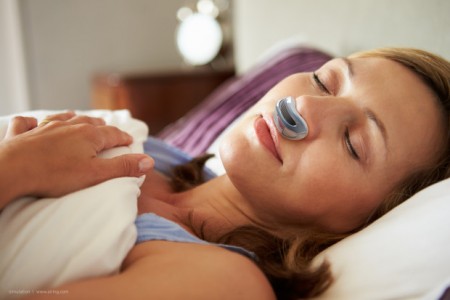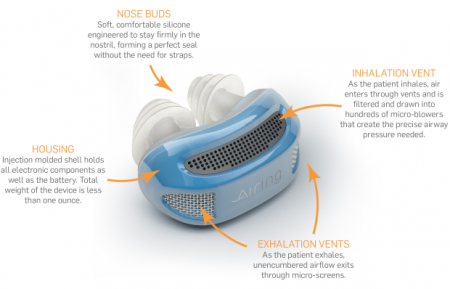June 21, 2015 – The disorder, obstructive sleep apnea, affects 12 million people in the United States today. It typically causes a person during sleep to stop breathing for periods of up to 10 seconds, 5 or more times per hour. It affects men and women almost equally according to Swedish researchers. Most of the time it goes undiagnosed. One of the suspect causes is obesity. And those who suffer from it may experience hypertension, atrial fibrillation and ultimately heart attacks. What ultimately causes the heart attacks? The lowering of oxygen levels in the blood because breathing is impaired. According to the National Commission on Sleep Disorders Research, 38,000 die in the United States each year because of cardiac events connected to sleep apnea.
The technology that is prevalent to treat sleep apnea is called Continuous Positive Airway Pressure (CPAP). Patients wear an oral appliance at night that includes a mask, hose and air pump. The pump’s air pressure is initially determined by a sleep specialist after a study that has the patient going to a sleep centre where they get hooked up to all kinds of sensors in an overnight test. CPAP has been life changing for those who suffer from the disorder. But a new device being funded on Indiegogo may prove to be revolutionary for sleep apnea sufferers.
It is called the Airing. It is hoseless, maskless and cordless, a micro-CPAP device weighing 25 grams (less than one ounce) that is far more comfortable and far less cumbersome than what is being used by millions today.
Current CPAP technology is far from perfect (see image on left below). The masks can come off the face during the night. The seals are not perfect. The sound of the air pump causes sleep disturbances. The hoses can get caught. And the devices need to be cleaned to ensure they don’t become a biological trap for infectious diseases.
Airing in contrast (being worn by the user in the image below on the right) is used once and then recycled. So each night the user gets a brand new micro-CPAP device.
How can Airing do this when other CPAP technologies cannot?
Each Airing is made of injection molded plastic. The ventilation system features micro-blowers, the same kind of technology used to ablate heat from the microprocessors in your computer. The built-in battery gives the device enough energy for a full night of protection The nose buds are designed to fit into nasal passages to maintain a perfect seal, so no straps are needed to hold it in place. With each inhale the micro-blowers deliver the precise amount of air pressure to the airways and lungs. Each exhale flows through micro-screen vents that sit below the inhalation vent. Airing eliminates snoring completely, a common occurrence for those diagnosed with sleep apnea.
When the company launched its Indiegogo campaign this month to raise $100,000 US., within 6 days it had attracted over 6,500 investors and $625,000 in pledges.
If you currently suffer from sleep apnea, or if you are using or have used and abandoned your CPAP device (which apparently happens a lot) then Airing could prove to be very liberating and a good buy. Interested in acquiring some. At the Indiegogo site if you pledge $70 you get a month’s supply. A pledge of $199 gets you 120 and possibly many sound nights’ sleeps.













